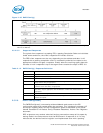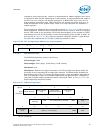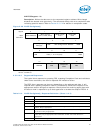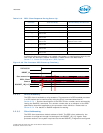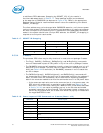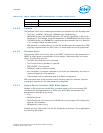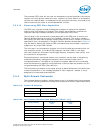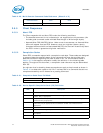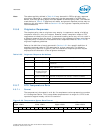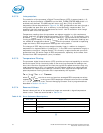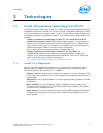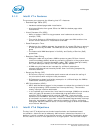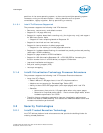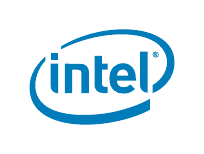
Interfaces
72 Intel® Xeon® Processor E5-1600 v2/E5-2600 v2 Product Families
Datasheet Volume One of Two
2.5.3.7.1 BMC INIT Mode
The BMC INIT boot mode is used to provide a quick and efficient means to transfer
responsibility for uncore configuration to a service processor like the BMC. In this
mode, the socket performs a minimal amount of internal configuration and then waits
for the BMC or service processor to complete the initialization.
2.5.3.7.2 Link Init Mode
In cases where the socket is not one QPI hop away from the Firmware Agent socket, or
a working link to the Firmware Agent socket cannot be resolved, the socket is placed in
Link Init mode. The socket performs a minimal amount of internal configuration and
waits for complete configuration by BIOS.
2.5.3.8 Processor Error Handling
Availability of PECI services may be affected by the processor PECI client error status.
Server manageability requirements place a strong emphasis on continued availability of
PECI services to facilitate logging and debug of the error condition.
• Most processor PECI client services are available in the event of a CAT_ERR_N
assertion though they cannot be guaranteed.
• The Ping(), GetDIB(), GetTemp(), RdPkgConfig() and WrPkgConfig() commands will
be serviced if the source of the CAT_ERR_N assertion is not in the processor power
control unit hardware, firmware or associated register logic. Additionally, the
RdPCIConfigLocal() and WrPCIConfigLocal() commands may also be serviced in this
case.
• It is recommended that the PECI originator read Index 0/Parameter 5 using the
RdPkgConfig() command to debug the CAT_ERR_N assertion.
— The PECI client will return the 0x91 completion code if the CAT_ERR_N
assertion is caused by the PCU hardware, firmware or associated logic errors.
In such an event, only the Ping(), GetTemp() and GetDIB() PECI commands
may be serviced. All other processor PECI services will be unavailable and
further debug of the processor error status will not be possible.
— If the PECI client returns a passing completion code, the originator should use
the response data to determine the cause of the CAT_ERR_N assertion. In such
an event, it is also recommended that the PECI originator determine the exact
suite of available PECI client services by issuing each of the PECI commands.
The processor will issue ‘timeout’ responses for those services that may not be
available.
— If the PECI client continues to return the 0x81 completion code in response to
multiple retries of the RdPkgConfig() command, no PECI services, with the
exception of the Ping(), GetTemp() and GetDIB(), will be guaranteed.
• The RdIAMSR() command may be serviced during a CAT_ERR_N assertion though it
cannot be guaranteed.
2.5.3.9 Originator Retry and Timeout Policy
The PECI originator may need to retry a command if the processor PECI client responds
with a ‘response timeout’ completion code or a bad Read FCS. In each instance, the
processor PECI client may have started the operation but not completed it yet. When
the 'retry' bit is set, the PECI client will ignore a new request if it exactly matches a
previous valid request.



